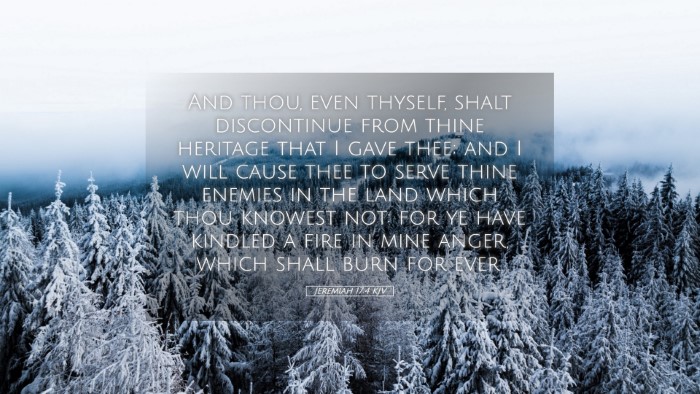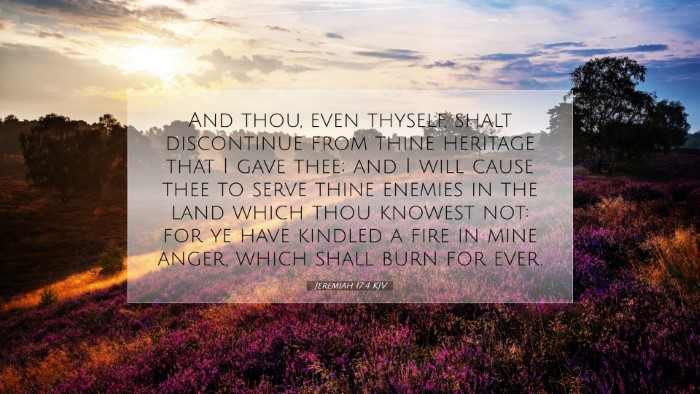Bible Commentary on Jeremiah 17:4
Jeremiah 17:4 states:
“And thou, even thyself, shalt discontinue from thine heritage that I gave thee; and I will cause thee to serve thine enemies in the land which thou knowest not: for ye have kindled a fire in mine anger, which shall burn for ever.”
Overview
This verse serves as a poignant reminder of the consequences of turning away from God. Jeremiah speaks prophetically to the people of Judah, warning them of the repercussions of their unfaithfulness. The verse encapsulates the theme of judgment while also indicating the vitality of divine inheritance and the seriousness of provoking God's wrath.
Historical Context
Matthew Henry notes that Jeremiah’s prophecies were delivered during a time of significant turmoil and impending doom for the Kingdom of Judah. The backdrop is the Babylonian siege, and the people have strayed from faithfulness, indulging in idol worship and abandoning their covenant with God.
Key Themes in Jeremiah 17:4
- Discontinuation from Heritage: The "heritage" refers to the land and the blessings given to Israel by God. Henry emphasizes that losing this inheritance is a severe consequence of rejecting God.
- Serving Enemies: Clarke points out that serving enemies in a foreign land symbolizes spiritual exile. It reflects a loss of relationship with God and the severance from His protective presence.
- Divine Anger: The “fire in mine anger” is a metaphor highlighting God’s righteous indignation towards sin. Barnes expounds on how divine anger is not arbitrary but a response to persistent disobedience.
Theological Insights
This passage highlights core theological principles that resonate throughout Scripture, especially concerning covenant faithfulness.
- God's Justice: The principles of God's justice are revealed in His dealings with Israel. Persisting in sin leads to destruction, which Henry asserts reinforces God's unwavering moral order.
- Human Responsibility: The text underscores human agency. Clarke articulates that the responsibility lies with people to choose fidelity to God rather than idolatry. The consequences of such choices are dire and unavoidable.
- The Nature of Sin: Delving into the nature of sin, Barnes reflects on how the fire of God's anger speaks to the consuming destructiveness of sin and its capacity to alienate humanity from divine grace.
Application for Today
While Jeremiah's message was directed to a specific historical context, its implications extend to contemporary life for pastors, students, and theologians alike.
- Faithfulness to God: The emphasis on maintaining a faithful relationship with God is crucial for bearing fruit in ministry and personal life. It is a reminder of the need for constant dependence on His grace.
- Awareness of Consequences: Understanding the gravity of sin and its consequences can lead to a more profound appreciation of God's mercy and grace in Christ. This verse calls for self-examination regarding one's alignment with God's will.
- Covenantal Promise: Recognizing that God desires an enduring relationship with His people invites a closer walk with Him. Reflecting on the heritage we have in Christ—a promise that surpasses the Old Covenant—challenges believers to remain steadfast.
Conclusion
Jeremiah 17:4 stands as a stark warning against the dangers of a divided heart and idol worship. Both ancient and modern audiences are urged to reflect on their spiritual state and return to a relationship marked by trust and obedience to God. As leaders and scholars engage with this text, it invites serious contemplation about God's unyielding justice balanced by His immense grace.
Further Reflection
This verse is exceptionally rich for further meditation. Pastors may find value in preaching a series on covenant faithfulness, while theologians might examine the implications of divine anger and human accountability in the broader context of Scripture. Together, we may seek to honor and serve the God who offers not only warnings but also the promise of restoration through repentance.


